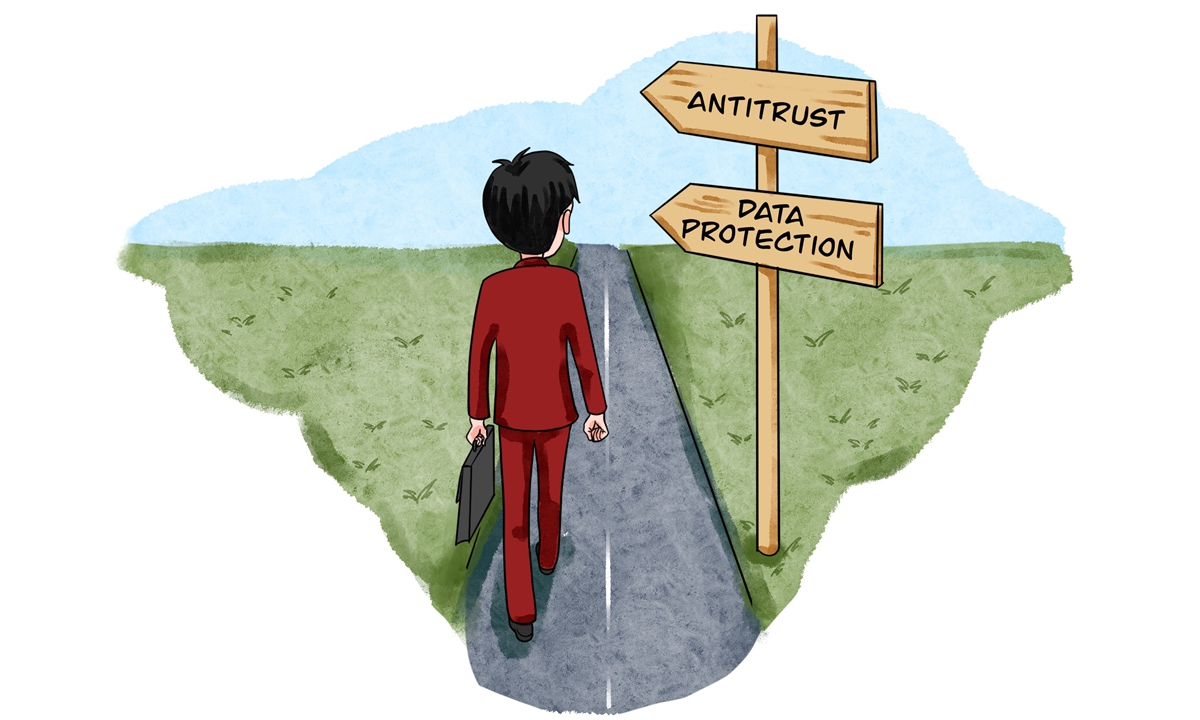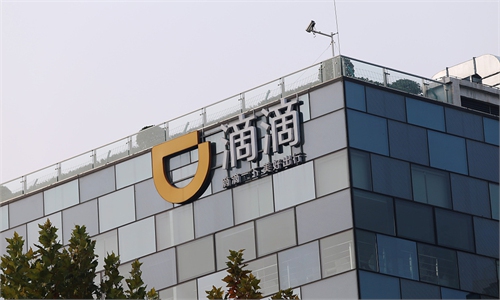COMMENTS / COLUMNISTS
China’s battle against monopoly, cybersecurity risks just getting started

Illustration: Tang Tengfei/GT
Editor's Note: This is the first piece of our new weekly column - China 360, which will offer a full and authentic take on the week's top news in China on every Friday.
Chinese regulators' swift actions against Didi Chuxing this week unleashed quite a shock wave through the financial market and the vast domestic digital economy. Since the first action - a cybersecurity review - on July 2, the online ride-hailing giant's new shares in the US has plummeted 23.31 percent, a drastic reverse of its $4.4 billion debut on June 30 when investors embraced the largest Chinese IPO in the US since that of Alibaba Group in 2014.
Investors are now wondering about the fate of Didi's shares as well as the future of Chinese IPOs in the US. As Didi faces not only regulatory scrutiny in China but also legal action from investors, some have floated the possibility of delisting. Also, as both Chinese and US regulators intensify their scrutiny on Chinese listings in the US, some have declared the start of a long-feared financial decoupling between the two countries.
Significant uncertainty remains. But one thing is set in stone: China's battle to crack down on Chinese internet giants to eradicate monopolistic behaviors and protect cybersecurity has just started and what we have seen over the past week or even the months since the actions against Ant Group may be just the tip of the iceberg.
While it remains unclear how Didi was able to make its debut before the regulatory investigation commenced, the trend of regulators flexing their muscles has been clear for some time. Then following the Didi case this week, China's top leadership and regulators issued unmistakable signals.
The 14th Five-Year Plan (2021-25) and long-range objectives through 2035 issued in March, the overarching document for China's policies in not just the next five years and 15 years, clearly stated China's goal to enhance cyber and data security. "Cybersecurity" and "data security" were mentioned by 18 times in the document.
The sweeping document also clearly stated China's plan to crack down on monopolistic behaviors and unfair competitions throughout the internet sector. As is the case for cybersecurity protection, the document called for bolstering legal and regulatory mechanisms and enforcement capabilities.
As if that signal wasn't abundantly clear, this week China's top leadership and regulators made several unprecedented moves in an extremely swift manner that made clear of their resolve and determination to tackle problematic issues, including monopolistic behaviors and cybersecurity risks.
The Cyberspace Administration of China (CAC) led the actions over the past week or so. The powerful body, which is also known as the Office of the Central Cyberspace Affairs Commission under the Central Committee of the Communist Party of China (CPC), first launched a probe into Didi's over cybersecurity issues and barred Didi from registering new users.
Two days later on Sunday, the CAC ordered app stores to remove Didi and the firm to rectify problems. One day later, on Monday, the agency launched cybersecurity probes into three more companies, including Boss Zhipin and Full Truck Alliance - both are listed in the US.
On Tuesday, in an unprecedented move, the General Office of the CPC Central Committee and the General Office of the State Council jointly issued guidelines stating that China will take steps to crack down on securities violations and amend rules for Chinese companies' overseas fundraising and IPOs and set a five-year goal of "zero tolerance" regulation.
On Wednesday, the State Administration for Market Regulation fined several internet giants including Alibaba, Didi and Tencent for violations of relevant anti-monopoly laws. On Thursday, Fan Yifei, deputy governor of the People's Bank of China, the central bank, stated that monopolistic behaviors are not exclusive to Ant Group and similar actions against Ant could be taken against other payment firms, a quite blunt warning for others companies.
While market attention has been fixated on Didi's case, the signal of a continuously intensifying campaign against monopolistic practices and cybersecurity risks cannot be ignored. The frequency of the actions and statements, the involvement of the top leadership and various government agencies combined with the specific nature of the messages all made it very clear that the fight against monopolistic practices and to protect cybersecurity is only to intensify.
That should be a clear warning for opportunists both at home and abroad that do not think that the storm will pass and they can go back to business as usual and bet against China's resolve to protect its market, consumers as well as national security.
The author is the deputy director of the Business News Center at the Global Times. bizopinion@globaltimes.com.cn



